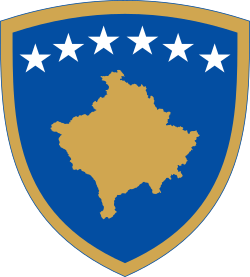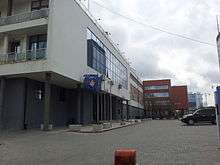Assembly of the Republic of Kosovo
| Assembly of the Republic of Kosovo Kuvendi i Republikës së Kosovës | |
|---|---|
| 6th Kosovan Assembly | |
 | |
| Type | |
| Type | |
| Leadership | |
|
Xhavit Haliti Aida Dërguti Kujtim Shala Slavko Simić Mufera Srbica - Şinik | |
| Structure | |
| Seats | 120 |
 | |
Political groups |
Government (52) Opposition (68)
|
| Elections | |
| Open list Party-list proportional representation | |
First election | 17 November 2001 |
Last election | 11 June 2017 |
Next election | 2021 or earlier |
| Meeting place | |
 | |
| Assembly Building, Pristina, Kosovo | |
| Website | |
| http://www.kuvendikosoves.org/?cid=2,1 | |
 |
|---|
| This article is part of a series on the politics and government of Kosovo |
| Constitution and law |
|
Legislature |
The Assembly of the Republic of Kosovo (Albanian: Kuvendi i Republikës së Kosovës; Serbian: Скупштина Републике Косово) was originally established by the United Nations Interim Administration Mission in Kosovo in 2001[2] to provide 'provisional, democratic self-government'.
On February 17, 2008, representatives of the people of Kosovo[3] declared that Kosovo is independent from Serbia and subsequently adopted a constitution, which came into effect on 15 June 2008.
The Assembly of the Republic of Kosovo[a] is regulated by the Constitution of Kosovo and has 120 members; of these, 100 are directly voted into the Assembly whilst the rest are reserved as follows:
- 10 seats for the representatives of the Serbs.
- 4 seats for the representatives of the Romani, Ashkali and Egyptians.
- 3 seats for the Bosniaks.
- 2 seats for the Turks.
- 1 seat for the Gorans.[4]
Albanian is the official language of the majority, but all languages of minorities such as Serbian, Turkish and Bosnian are used, with simultaneous interpretation.
Committees
The Kosovo Assembly has 19 committees:
- Budget Committee
- Committee for Finance and Economy
- Committee for Education, Science and Technology
- Committee for Health
- Committee for Labour and Social Welfare
- Committee for Public Services
- Committee on Foreign Affairs
- Committee on Judicial, Legislative and Constitutional Framework Matters
- Committee on Missing Persons – it is a relatively unique committee that deals with the issue of large number of missing persons and prisoners of war as a result of the Kosovo War.
- Committee on Media
- Committee on the Rights and Interests of Communities
- Committee for Trade and Industry
- Committee for Culture, Youth and Sports
- Committee for Environment and Spatial Planning
- Committee for Transport and Communications
- Committee for Agriculture, Forestry and Rural Development
- Committee on Emergency Preparedness
- Committee on Public Petitions and Claims
- Committee on Gender Equality
Election results
| Party | Votes | % | Seats | Ideology |
|---|---|---|---|---|
| PANA Coalition | 245,646 | 33.74 | 41 / 120 | Economic liberalism, Albanian nationalism |
| Vetëvendosje! | 200,138 | 27.49 | 32 / 120 | Social democracy, Albanian nationalism, Civic nationalism, Direct democracy, Egalitarianism, Kosovo–Albania unionism |
| LA Coalition: | 185,892 | 25.53 | 27 / 120 | Social conservatism, Economic liberalism, Albanian nationalism |
| Serb List | 44,578 | 6.12 | 9 / 120 | Serbian nationalism, Minority politics |
| Minorities | 31,666 | 4.36 | 11 / 120 | Minority politics |
| Source: KQZ, KQZ, KQZ | ||||
Notes and references
Notes:
| a. | ^ Kosovo is the subject of a territorial dispute between the Republic of Kosovo and the Republic of Serbia. The Republic of Kosovo unilaterally declared independence on 17 February 2008, but Serbia continues to claim it as part of its own sovereign territory. The two governments began to normalise relations in 2013, as part of the Brussels Agreement. Kosovo has received formal recognition as an independent state from 113 out of 193 United Nations member states. |
References:
- ↑ ""
- ↑ "Constitutional Framework for Provisional Self-Government"
- ↑ "Archived copy" (PDF). Archived from the original (PDF) on 2010-07-23. Retrieved 2012-08-19.
- ↑ ""
External links
- Official website (in English) (in Albanian) (in Serbian)
- Constitutional Framework
Coordinates: 42°39′53″N 21°09′51″E / 42.66472°N 21.16417°E